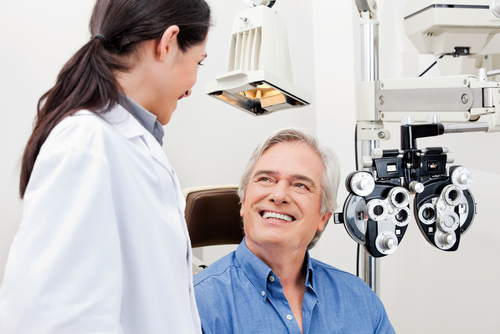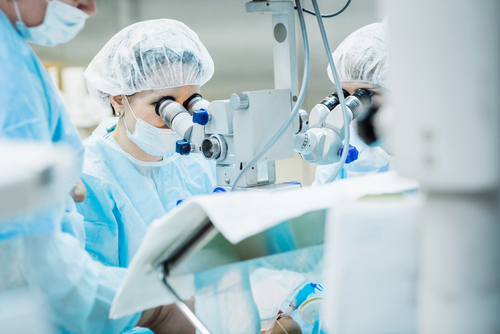Posted by: Focal Point Vision in Uncategorized

If you are over fifty years old, your risk for developing age-related cataracts is increasing. Everyone will eventually develop clouding of the natural lens, known as cataracts if they live long enough.
These changes to the tissue of the natural lens can cause worsening vision issues over time. There are no treatments that can stop cataracts or slow them down once they start developing, but cataract surgery to replace the natural lens can restore your vision.
Keep reading to learn more about cataracts, their causes, and how they are treated!
What Are Cataracts?
Cataracts are clouded or discolored patches that form on the natural crystalline lens of the eye. The lens is a clear, flexible disc that sits behind your pupil.

It helps focus light onto the retina, which sends the information to your brain. The lens is made of proteins that can degrade and clump up, creating cataracts.
When cataracts form, portions of the lens become cloudy or discolored, so light can’t pass through it as well. This affects how much light reaches the retina and can make it harder to see.
Cataracts can cause symptoms such as:
- Blurry vision
- Sensitivity to light or glare
- Difficulty seeing at night
- Dimmed or faded colors
- Double vision
What Causes Cataracts?
For most people, cataracts are age-related. Over time, the proteins that make up the lens break down and form clumps.

The clumps of protein are what cause the cloudy patches that form cataracts. Not all cataracts are age-related.
Some people are born with cataracts, and they can also develop due to eye injuries. Everyone will develop age-related cataracts as older adults.
Cataracts typically start developing between the ages of forty and fifty. In the beginning, cataracts are small and may not cause any noticeable symptoms.
Many people don’t notice vision changes for years. You may only know you have cataracts after an eye doctor notices them during a routine exam.
Eventually, cataracts will get larger and start affecting vision.
Can Cataracts Be Prevented?
Unfortunately, cataracts aren’t preventable and there are no medications you can take to slow or stop them. However, you may be able to reduce your risk of developing cataracts prematurely by making healthy lifestyle choices such as:
Avoiding Tobacco
Smoking tobacco is linked to an increased risk of cataracts. Avoiding tobacco use or quitting smoking can improve your eye health.

Protect Your Eyes From the Sun
Exposure to UV rays from the sun has been linked to cataracts. Protect eyes from UV exposure by wearing UV-blocking sunglasses.
You can also protect your eyes by wearing wide-brimmed hats or staying in shady areas when possible.
Use Proper Eye Protection
Eye injuries can cause cataracts, so wear appropriate eye protection during work, sports, or other hazardous activities.
Choose a Healthy Diet and Exercise
Eating a balanced diet that includes leafy greens, nuts, and whole grains may slow the onset of cataracts. Healthy habits and physical activity can help you manage underlying health conditions like diabetes, which may increase cataract risk.
Get Regular Eye Exams
The only way to diagnose cataracts is with comprehensive eye exams. Your eye doctor can use routine screening tools to identify cataracts and monitor their progress.
Your eye doctor can help you decide when it’s time for cataract surgery.
Can Cataracts Be Cured?
Cataract surgery is the only way to restore vision affected by cataracts. When you first develop cataracts, and the symptoms are mild, you may be able to accommodate vision changes without having cataract surgery.
Talk to your eye doctor about adjusting your prescription for glasses or contacts. Try other strategies like increasing the brightness of computer screens and having bright enough lighting in your home or office.
If cataracts are making it difficult to do daily tasks like driving, reading, watching TV, or joining friends and family for activities, it may be time to consider surgery.
What is Cataract Surgery?
Cataract surgery is a highly safe and effective procedure. You won’t need general anesthesia, and your eye doctor can perform the procedure in their office.

The procedure is painless, though you may experience soreness or discomfort as you recover. You can go home the same day as the surgery, and you’ll be able to resume normal activities gradually as your eyes heal.
During cataract surgery, your eye doctor uses specialized tools to make a small incision and remove the clouded lens from your eye. They replace the lens with an artificial lens that they insert into the space where the natural lens sat.
Cataract surgery can fix the vision issues caused by cataracts. In addition, the artificial lens can address other vision issues, such as nearsightedness, farsightedness, or astigmatism.
Depending on which artificial lens you choose, you may even be able to reduce your dependence on visual aids like contact lenses and glasses.
Do you want to learn more about how cataract surgery can restore vision? Schedule an appointment at Focal Point Vision in San Antonio, TX, today!
